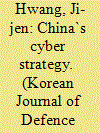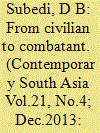|
|
|
Sort Order |
|
|
|
Items / Page
|
|
|
|
|
|
|
| Srl | Item |
| 1 |
ID:
151256


|
|
|
|
|
| Summary/Abstract |
People`s War was originally considered a military concept suited to the traditional battlefields of mainland China, involving the mobilization of the massive populace in order for the inferior forces of the Chinese Communist Party (CCP) to defeat a superior adversary. However, in the past few decades, this tradition of People`s War has not merely been useful for developing military strategy, but has also been applicable to many other national developments, such as economics, social modernization, and government and public affairs, as a vital “behind-the-scenes” guideline to garner a certain consensus from the Chinese people in order to carry out the policies that the Chinese government wishes to implement. In particular, this tradition can be perfectly applied to China`s cyber warfare in the digital age, as the strategic value of cyberspace has removed the restriction of traditional geographic barriers and borders between states. Thus, the potential masses of Chinese “cyber warriors” can carry out attacks geographically unhindered in cyberspace. It is thus of global significance that China, a rising world superpower, is currently expending great effort on developing warfare in cyberspace. This paper investigates how China`s fundamental strategic doctrine, People`s War―which is traditionally based upon geographical battlegrounds―can be integrated into the concept of cyberspace as a potential battlefield. Meanwhile, some interviews were also conducted in Taiwan in order to further dissect some thematic propositions merged from documentary resources.
|
|
|
|
|
|
|
|
|
|
|
|
|
|
|
|
| 2 |
ID:
127081


|
|
|
|
|
| Publication |
2013.
|
| Summary/Abstract |
Although combatants played a vital role in the People's War (PW) waged by the Maoists in Nepal, there is a dearth of knowledge about what motivated or compelled people to join the war, as well as what made the Maoists so successful in recruiting and mobilising committed insurgents. Engaging with these questions, this paper aims to understand the causes and drivers of combatant recruitment in the PW. The existing literature demonstrates that armed recruitment and participation in conflict is a phenomenon driven by structural and environmental factors in addition to other conditions, including class-based oppression as well as caste and ethnic grievances. This study, however, contends that in the Nepalese context, while such structural inequalities and disparities created favourable conditions for the PW to escalate, these factors alone cannot sufficiently explain: (a) how and in what ways the Maoists radicalised people or coerced them into becoming combatants and (b) what role the insurgent organisation and the state played in the recruitment dynamics. It argues that an understanding of armed recruitment and participation in the PW should also take into account certain mobilising factors, such as the Maoists' ideology and radicalisation campaigns. Furthermore, it situates the recruitment of combatants within the security paradigm and establishes that the insecurity and violence, caused by both the insurgent organisation and the state, explain voluntary as well as involuntary modes of armed recruitment in the PW.
|
|
|
|
|
|
|
|
|
|
|
|
|
|
|
|
|
|
|
|
|